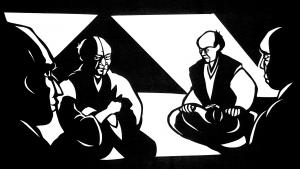The story
Jokyo[1] Gimin[2] Memorial Museum
What was the Jokyo Rebellion?
It was October in the third year of the Jokyo era (1686), when the winter cold was creeping on Azumino,[3] The domain lord, Mizuno Tadanao, was away in Edo[4] for alternate-year attendance. Life had not been easy for the peasants in Matsumoto basin, for they had had poor crops of rice because of cold weather over the past dozen years or so. On top of that, collecting of tax was exacted more severely than ever that year. The atmosphere among tax-collecting officials and peasants was increasingly tense.
“Even farmers are humans and entitled to live in peace,” Tada Kasuke voiced his concern. A number of his sympathizers gathered, among whom were Kasuke’s right arm, Oana Zembei, and his daughter, Shyun, who worked as a messenger. One person said, “We may have to appeal to the magistrate’s office.” Another protested, “No, we aren’t allowed to do that.” Still another insisted, “We accomplish nothing by doing nothing.” And they came to a conclusion.

On October 14th, Tada Kasuke, along with his sympathizers, went to the magistrate’s office outside Matsumoto castle. “We are here today to ask a special favor of you.”
Appeal of five articles
- Rendering rice tax after removal of beard[5] is too much of a burden.
- One bale of rice, in the past, contained 2.5 to[6], but this year it is required to hold 3.4 or 3.5 to. We ask for a reduction to 2.5 to a bale.
- Five percent of rice tax is collected in the form of soy-beans, half of which is collected in cash. We ask that the tax money be calculated based on the price of rice, not on the price of soy-beans.
- We are obligated to shoulder a part of the cost of transportation of Edo bound and Koufu[7] bound rice. Since we are farmers who don’t own good horses to do the job, the burden of transportation is too much. We ask for a reduced obligation concerning the transportation of rice; only to the domain limits.
- We are obligated to shoulder a part of the personnel cost of local and Edo offices, which is too much of a burden.
From Farmers in the domain
October 13th

The appeal was met with a brusque “no” from the office: “You must know that appeals are forbidden. Go away.” But Kasuke and his comrades would not budge. And before long, they found themselves backed by ten thousand peasants who gathered at the spot.
Response paper signed by officials
- The farmers’ claim that tax this year has been raised to 3.4 or 3.5 to came as a surprise to this office, for it has been raised without our knowledge. Hence required tax is 3 to a bale[8], and no need to remove beard.
- Concerning five percent of tax collected in the form of soy-beans, half of which is collected in cash: The tax money will be calculated based on the price of rice, as the farmers wish.
- Concerning the first part of the burden on farmers for transportation of Edo bound and Koufu bound rice: The farmers’ complaint that they are required to make up for the loss of rice during the transportation has been found to be justified, for the requirement was imposed without our knowledge. Hence no need to make up for the loss of rice.
- Concerning the other part of the burden of transportation of Edo bound and Koufu bound rice: Edo bound rice is expected to be transported as usual, but Koufu bound rice is expected to be transported only as far as Shiojiri[9].
- Concerning the personnel cost of local and Edo offices: The farmers’ complaint is justified, for the obligation of shouldering the cost was imposed without our knowledge. Hence personnel cost is forbidden.
From Official, Hineno Gihei
Official, Kojima Gorobei
October 16th
The executives of the Matsumoto domain were at a loss what to do about this incident. They had to settle it peacefully. And yet, Kasuke and other farmers lingered near the castle, to the dismay of the domain officials. At last they fully accepted the farmers’ appeal. The executives agreed to grant the farmers’ wishes. But that was a lie, which the officials used as a tactic to settle the incident. A month later, Kasuke and other leaders of the uprising were caught and crucified. Even their family members were caught and beheaded. Twenty-eight farmers were executed in all. Tax was collected as severely as initially feared it would be done.
Didn’t this uprising have any meaning? Yes, it did. It lit a fire in people’s hearts. And that fire pushed the demand for democratic rights two hundred years later.

The declaration issued by the domain government on the day after the execution
- A large number of farmers gathered at Matsumoto castle and handed in an appeal of five articles. Not satisfied with the response from the local officials, they remained there from October 14th through 18th. They retreated only after all their wishes were granted.
- Not only did they unlawfully appeal, but they also incited arson and burglary. The leaders, and only the leaders, were prosecuted.
- The appeal of five articles they handed in is not to be accepted. The farmers’ action was outrageous.
November 23rd
[1] Jokyo era (1684-1688), during the Edo period
[2] martyr, in the non-religious sense ; a person who sacrifices his life for a cause
[3] a part of Matsumoto basin, Nagano prefecture
[4] old name of Tokyo
[5] processing of reaped rice which required huge amount of time and effort
[6] a measure of volume; 1to is 18 litres
[7] a city in Yamanashi prefecture
[8] Note that 2.5 to (what the farmers had asked for) was not accepted.
[9] a city in Nagano prefecture